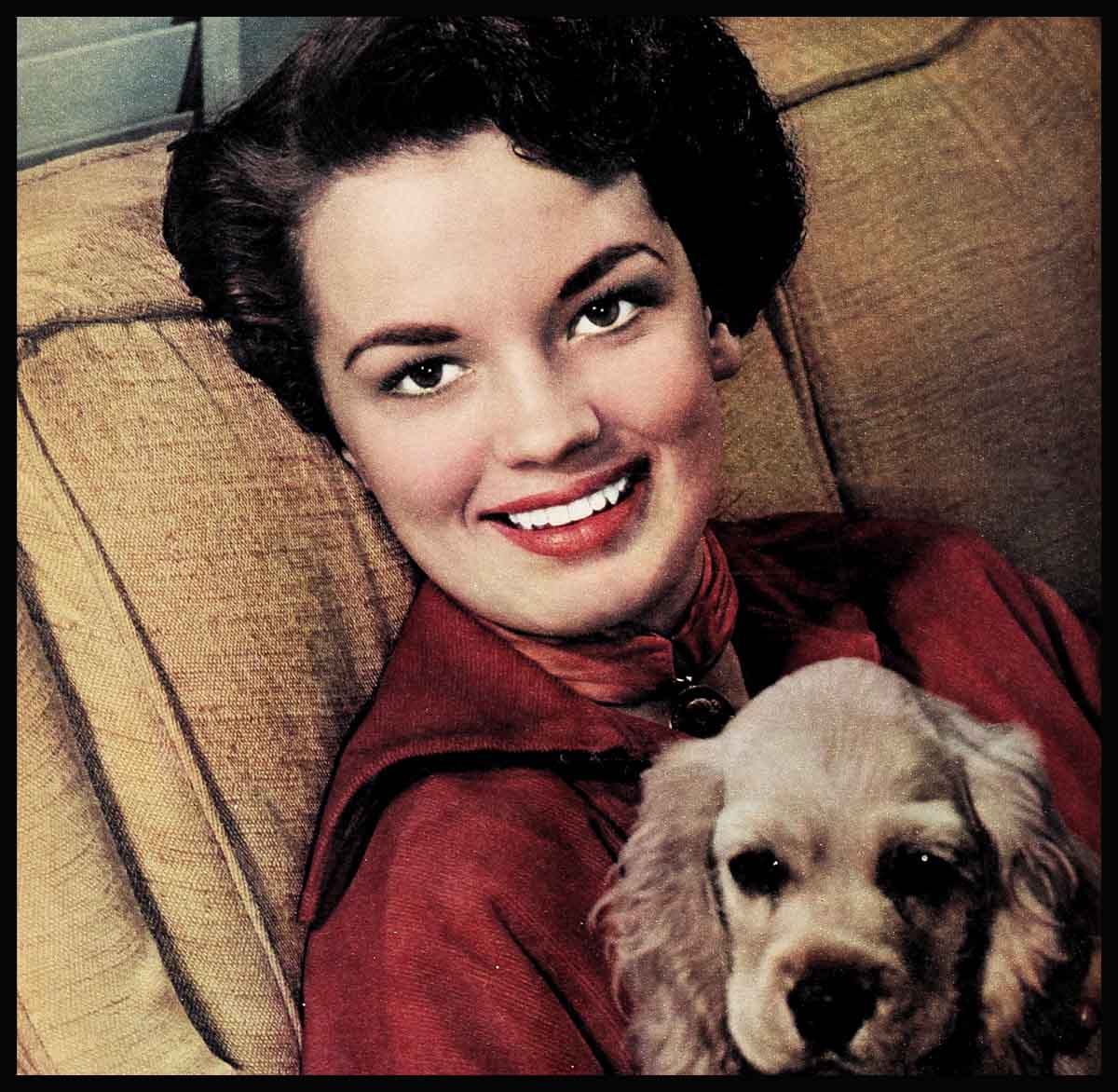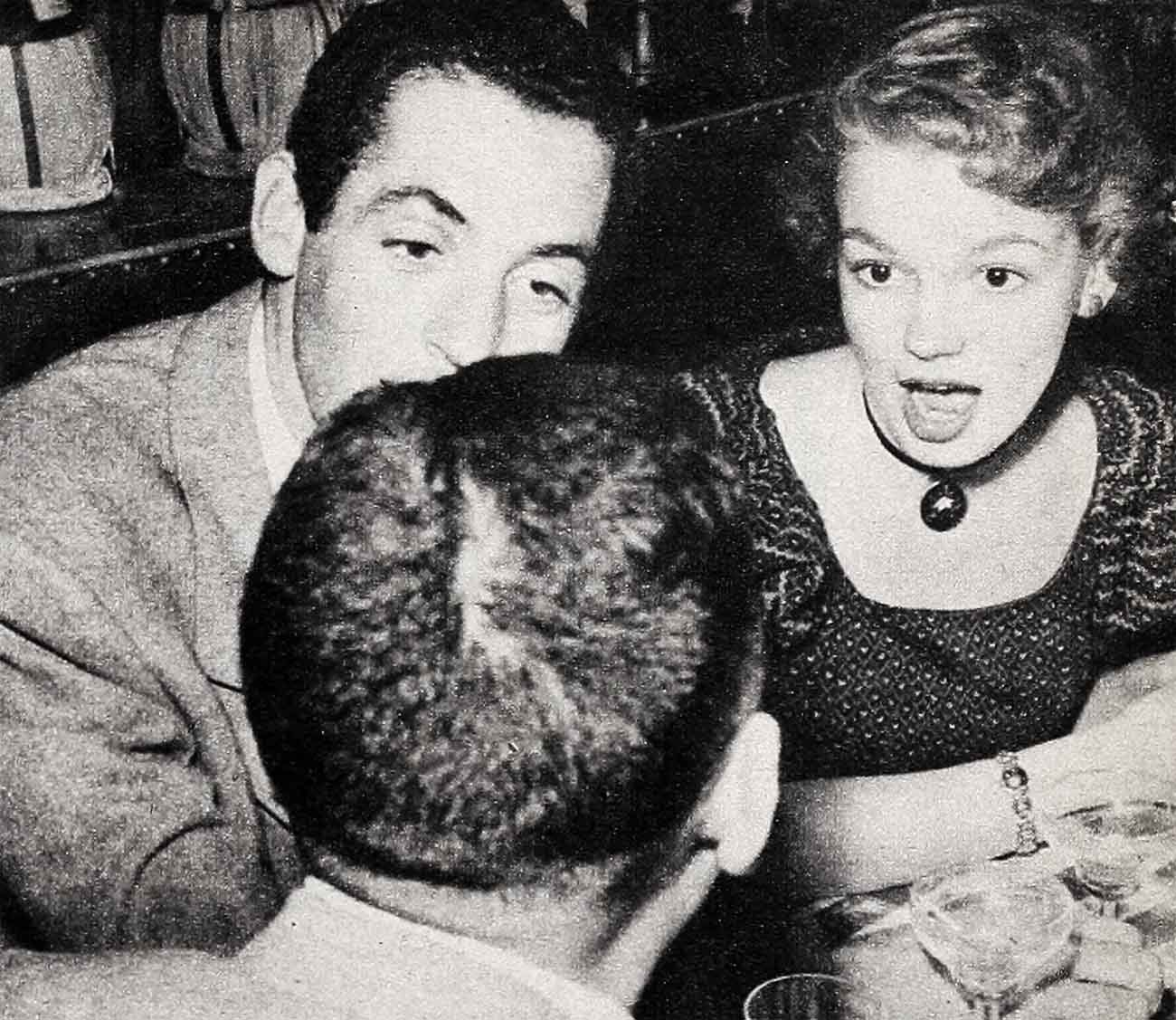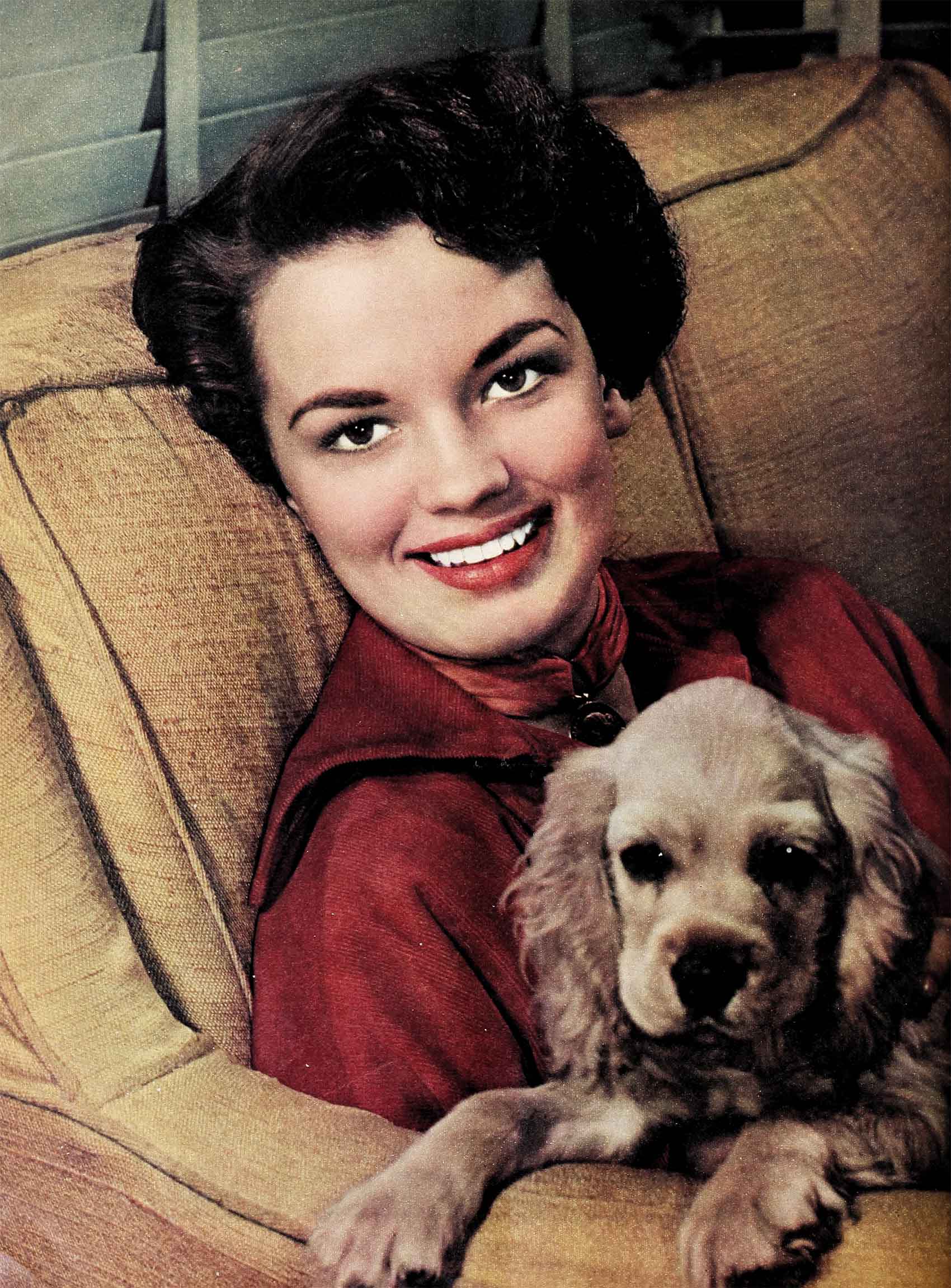
Me . . . And Boys—Joan Evans
We teen-agers, if you believe what a lot of grown-ups keep telling us in newspapers and magazines, are a miserable lot, struggling to grow up, worried about how to be “popular,” how to “rate with the gang,” how far to “go” with the opposite sex. Generally, let’s face it, we’re supposed to be in “Big Trouble.”
Until a few weeks ago, I didn’t believe a word of it. Not that I didn’t have problems.
To be just fifteen and launched on a very exciting career is a wonderful thing, but it makes for complications, too.
For instance, I’m still of legal school age, and must keep up with a standard high school course whether I’m working in a picture or not. This means three hours with my tutor every day, on top of acting lessons, singing lessons and dancing lessons, plus the million and one “extras” which are part of my job.
So it happened that for some time after I came to Hollywood, trying to be a good student and a good actress simultaneously was the only problem of which I was seriously aware. Then I was invited to visit a journalism class at one of the Los Angeles high schools.
I was asked to make a speech on “Teen-age Problems.” The very thought of making a speech turned me into an icicle. I have learned to perform before a camera without self-consciousness. But the idea of standing up and making like an authority before a group of boys and girls my own age was terrifying.
However, I promised to go if, instead of making a speech, I could have an open forum and answer questions. I should have made the speech!
The sort of questions I had expected, questions like “How do you get started in a career?” “How important is going to college?” just didn’t come up.
I was met, instead, with a barrage of “How do you feel about going steady?” “What do you do when a boy invites you to a very important party and your mother says you have to be in at eleven o’clock?” “What about necking?”
I was flustered. Saying the first thing that came into my head, I answered the last question first.
“About necking,” I said. “I’m against it. If, for no other reason, that word, itself, would scare me away.”
I could see by their faces that the answer wasn’t good enough. I realized that it had been too flip, too easy. The question of casual love-making (I refuse to use the word “necking”) was really disturbing these kids.
Now I know perfectly well that there are plenty of girls who think nothing at all of kissing a boy after a few meetings. And I have been told by people older and wiser than I that this is perfectly natural, that the sort of horseplay between boys and girls which I see all the time at the beach, for instance, is no more scandalous than a bunch of puppies playing.
They may be right. Maybe I’m a prude, maybe I’ll change my mind when I get a little older, I don’t know. But right now I feel very strongly that the healthiest and happiest way out of this dilemma of “how far do we go, if we’re nice girls,” is to wait until we can ask ourselves the question without fear and anxiety. How far, indeed, can we go, or rather, where, once this sort of thing has started, can we stop, if there are no traffic signs except the approval or disapproval of our friends?

We know in our hearts, I believe, when things are right, or “normal,” or “natural” for us. Nobody’s opinion of me matters as much to me as my opinion of myself, and no other person’s set of rules will suffice for me.
I wouldn’t think of answering the question of “how far do we go” for anybody. I am convinced every girl must answer it honestly and frankly herself.
“Look,” I told my audience, “maybe I’m not the person to answer these questions. In a way, although I’m your age, my case is rather special.”
I explained then that the boys I go out with, for the most part, are older than I, grown men, really, who have jobs, too. I told how my social evenings usually were a continuation of my working days, how we either went out to dinner and talked about pictures or we went to the movies or the theater or a concert and later talked about the performances we’d seen. Or how we’d go to the beach and swim, or square-dancing and dance. The business of “necking” had just never come up.
There was one time that was an exception. I went out with a man I didn’t know very well. He was an actor and thought himself terribly sophisticated, a “wolf,” I guess he thought he was. He seemed to have different ideas than I did about what made a “fun” evening. But I won. I could be downright rude to him without a qualm because I didn’t really care whether he ever called me again. He didn’t.
It’s not that I don’t look forward to some romance in my life. But when it comes, I hope it will be a sort of climax to knowing someone very well. It certainly won’t be a climax to a first date.
The “wolves” may, if they like, think me a prude. I wouldn’t like myself if I pretended to feel something that just wasn’t there. Sometimes I think that people worry too much about being “popular,” reach out for the approval of others at the cost of hating themselves. I think that kind of popularity is too expensive.
No matter how well I have been able to work this out in my own mind, I can still see perfectly well how troubling this question of “necking” could be if a girl were one of a high-school gang in which this kind of thing were taken for granted. No matter how deeply she rebelled in her heart, if the crowd said, in effect, “don’t be a prude or you’ll be unpopular,” she’d conform. And she’d be “popular,” maybe! But, also, if “necking” went against her instincts, she’d be miserable.
I think most girls my age, if they are honest about it, are not emotionally ready for love-making, and so are frightened by it. Oh, I don’t mean that a girl need think she has involved herself irrevocably if she kisses a boy good-night, but sitting around in the dark in a parked car with a boy is something else again. Granted, some girls and some boys have a more overpowering urge for that sort of thing than others. But most teen-agers, I think, are afraid of it. The trouble is, they’re more afraid of being “different.”
Before I signed my contract I went to a private school in New York and I expect I was the most “different,” and probably the most “unpopular,” girl in school. I was absolutely certain what I wanted to do with my life. I wanted to be an actress. I was burning up with ambition to express myself. I had one real friend in that school, Barbara Kahn. Barbara, I guess, was the second most “unpopular” girl there. Barbara wanted to be a writer. Both of us were much too busy and too interested in what we were doing to worry much about whether the other girls liked us.

The important thing about this, it seems to me, is that by being busy, by being interested in something, we were spared a lot of the miseries which other girls of our age seemed to be going through.
The girls who are unhappiest about their relations with boys, it seems to me, are girls who are interested in nothing but boys. But emotional awakening isn’t the only kind of awakening that goes on in those crucial teen years.
We’re outgrowing childhood, becoming individuals, each with talents and aptitudes of his own, if we’re not too afraid of being “different” to use them. It doesn’t matter what the talent is, it increases your value as a person.
We’re richer, our lives are broader, if we use the capacities we have. And girls who are doing things, excited about things, are a lot more attractive to boys than dumb bunnies who sit back, figuratively, and say, “I’m not interested in anything but you. All I want is your love.”
This kind of attitude may work for awhile. But it doesn’t stand up in the long haul. Boys may be flattered by the clinging vines for awhile, but after the flattery wears off they have a lot more fun, and admit it, with a girl who isn’t afraid to Be Herself.
I found out from the students that the boys, “the gang,” aren’t always the only obstacles to a teen-ager trying to be a Person on her own. “Our parents,” some of them groaned, and I gathered that many parents took the attitude that, “when you’re earning your own living, you can do what you like, but as long as you’re in this house you’ll do as we say.”
I’m lucky, I guess. I have very unusual parents. They have treated me as a Person with my own rights and my own responsibilities for as long as I can remember, and you don’t abuse freedom if it’s given to you trustingly.
I don’t think my mother has ever handed down an edict about the hour I must get in at night, but I have. A six a.m. call at the studio is a more terrifying curfew to me than any parental ultimatum. As an actress, I have to look well, feel well, to work. That means I must get at least eight hours’ sleep. Whatever you’re doing with your life, provided you are doing something, that sort of self-control must operate, I think.
I don’t want anybody to think that I’m a stick-at-home with her nose in a collection of Greek drama all the hours ’m not in front of a camera, a girl whose only moments of romance occur when she’s kissed by Farley Granger in a scene. (I will admit, though, that that time in “Roseanna” was the first time I ever was kissed by a boy.)
I go out a lot, when I’m not in a picture, with lots of different young men.
I would rather go out with several boys, I’ve decided, than confine myself to one. I’m much too young to think about getting engaged, so why shouldn’t I get to know as many men as possible, have as good as possible a basis for comparison?
Only once did I find myself liking one boy so much better than the others that I considered “going steady.”
Everything we did together was fun. We were interested in the same things, we never had a boring evening together.
But he broke a date with me once and I felt terribly let down and rejected.
“This is no good,” I told myself firmly. In my kind of life, and this goes as well for the lives of most of my friends, a broken date can’t be that important. Not yet, anyway. So I talked myself out of the dumps and went out to dinner with another boy. And had a wonderful time.
Now I realize that at some time or other I have had to cope with most of the same problems which were disturbing these other teen-agers. But I had another outlet in my acting, through which I could safely let off steam.
Such outlets are at hand, I am convinced, not just for “special case” fifteen-year-olds like me, but for all teen-agers.
How to find these outlets?
Know what you want to do with your life, want it terribly. Get excited about it, work at it, study, learn all you can. Be better than anybody else at some one thing, anything. You’ll be surprised how fast emotional problems can be dissolved in interest and excitement and work.
THE END
—BY JOAN EVANS
It is a quote. PHOTOPLAY MAGAZINE JUNE 1950




